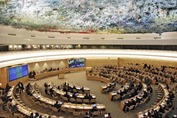 Pushed to the wall on the US sponsored resolution against it at the UN Human Rights Council in Geneva, the Sri Lankan government is now trying to stall the vote citing legal and procedural implications.
Pushed to the wall on the US sponsored resolution against it at the UN Human Rights Council in Geneva, the Sri Lankan government is now trying to stall the vote citing legal and procedural implications.
On Wednesday, the Sri Lankan government representatives circulated a 14-point document among diplomats and lobbyists at the UNHRC, picking holes on the resolution. But human rights activists in Geneva told Firstpost that such last ditch efforts are unlikely to yield any result. The backers of the resolution are firm in their resolve.
The main argument of the Lankan government is that the resolution will lead to the Council “taking on the character of a tribunal that will exceed its mandate” and that it will lead to polarisation of people. It will also derail the reconciliation process.
It is the first time that the Council is taking up past issues, the note said. “The resolution undermines the cardinal principle and well entrenched rule of international law that demands the exhaustion of domestic remedies. Suspicion and criticism of domestic remedies undermines also the judicial process in democratic countries, and introduces a political dimension that attacks the independence of the judiciary.”
The note also warned developing countries that reopening past issues, as the resolution did, will pose a clear risk to them, particularly for collateral reasons. Taking action on the LLRC (Lessons Learned and Rehabilitation Commission) report, that has not been placed before the Council for deliberation, will be a precedent by which action can be taken on any document.
“The resolution judges the intentions of an elected government, and proposes actions that arise from unwarranted hypotheses. These hypotheses are of a piece with the condign criticism from countries advancing this resolution when the LLRC was appointed.”
The government also strategically targetted the Office of the High Commissioner for Human Rights (OHCHR), which will be asked to provide technical assistance to Sri Lanka in case the resolution is passed, saying that such an arrangement can be based only on mutual consent. “The conflation of these with Special Procedures and the requirement of a sovereign government to mandatorily accept such advice are totally contrary to the principle of sovereignty, and have no precedent.”
The Sri Lankan government also raised serious concerns about the lack of transparency of funding for OHCHR special operations in the country if the resolution is passed. If the resources are coming from “opaque funding sources,” developing countries must register their concern, the note further said.
Noting that the resolution will affect the reconciliation process in the country, the government said: “It will only contribute to polarisation in a society that has begun to come together through the various reconciliation initiatives that have commenced.”
Ending the note, the government said the country needed to move towards a pluralistic society “in which all citizens can live together in harmony, equality, dignity, justice, self-respect and inter-dependent prosperity.” The resolution aims to make the reconciliation satisfactory to external perspectives rather than those of Sri Lankan citizens, and hence will only benefit disruptive forces.
In terms of procedural lapses, the note said, the resolution “undermines a decision taken by the Council in 2009, and is doubly intrusive because there has only been change for the better since that decision.”
Additionally, it said: “the Council mandate provides for resolutions to address specific country issues through the UPR or through special sessions in cases of emergency. The alternative is under Item 4; when circumstances have arisen that require special attention, because there are current instances of gross and systematic violations.”
Meanwhile,Human rights activists in Geneva said that the giant sized Sri Lankan government delegation brought to lobby against the resolution appeared intimidatory to the rights activists from the country.
The bullying was so noticeable that at one stage the High Commissioner for Human Rights and the President of the UNHRC had to warn the government against such harassment.
Activists also said that the Indian representatives at the UNHRC have apparently sent confusing messages to the Sri Lankan delegation, perhaps in a bid to placate them. The Sri Lankans had heavily counted on Indian support and were shocked out of their wits when the statement of Indian prime minister reached Geneva and Colombo. In fact, panic gripped the Lankans only when India said it would support the resolution.
In the 47-member UNHRC, the resolution requires a simple majority to pass. The changing tact of the Sri Lankan government is a certain giveaway that it is under tremendous anxiety of a possible loss.
The resolution asks Sri Lanka to implement the recommendations of the LLRC report and address alleged human rights violations. If it is passed, the OHCHR will be mandated to work with the Sri Lankan government to take action on the issues concerned.
Meanwhile, prominent MPs in the UK,Douglas Alexander, David Miliband, Jack Straw, and Margaret Beckett alleged human rights violations, as noted by a 2011 UN report, militarisation of the Tamil majority areas; and that socio-economic and political curtailment of Tamils continued.
In a letter published by The Guardian, urging all council members to support the resolution, they said “establishment of military, rather than independent, courts of inquiry to investigate some army and navy actions suggests true accountability will not be forthcoming from within Sri Lanka.”
“This resolution, if implemented, would be an important first step in ensuring long-lasting peace. We, and all council members, must support it,” they added. (First Post)
(For updates you can share with your friends, follow TNN on Facebook and Twitter )
